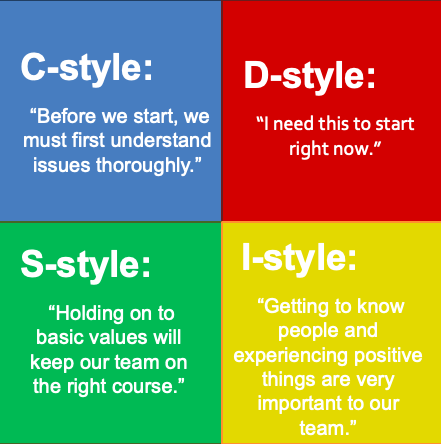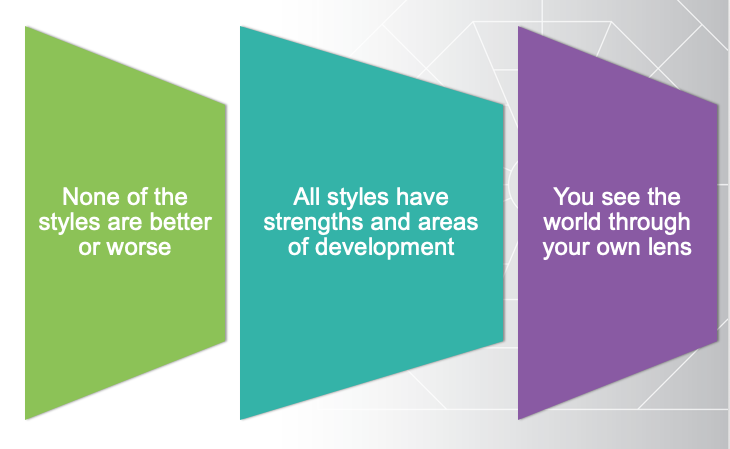Have you ever noticed you “click” with some people; while others annoy you?
Why is it that some people irritate us and get under our skin, while other people don’t? I'm going to challenge you to think about it. Take a minute and look around you. Is there anyone in your work setting that irritates you? What is it specifically about that person that annoys you?- Is it their need to control tasks and things?
- Are they overly optimistic or maybe even unrealistic?
- Do they need too much attention?
- Is it their know-it-all attitude?
- Do they constantly need support and reassurances?
- Or do they ask too many questions?

Pinpointing what annoys you doesn’t make you a bad person. Some individuals might irk us and get under our skin; while someone else might think that same person is totally fine. So, why isn’t everyone annoyed by the same things?
Self-Awareness is Key
Being able to identify what behaviors annoy you about someone else is a step in the right direction. It provides you with improved self-awareness. Now, this may shock you; but the person who is annoying you, isn’t necessarily an annoying person. Truth be told, they might even find you annoying! Essentially, the behaviors and actions of others are neutral. It's our own DISC style, experiences, and thoughts that add value to the behaviors. We each see the world through our own unique lenses.
The Extended DISC assessments can help you understand the lens in which you view the world. They also help you understand how people are similar and different. Having this awareness can help us identify what may potentially annoy us about others. Sometimes it's the similarities that frustrate us; however, oftentimes it's the differences that annoy us.
The Lens and the Frustration
Let's take a look at the four DISC styles and learn about the lens in which they see the world and what it is about each style that others may find frustrating. First, let's take a look at D-styles. D-style individuals are focused on results; they want to accomplish and achieve great things. They tend to be fast-paced and determined. D-styles want to get things moving so they can achieve those results. Oftentimes, this fast-paced, results-focused approach leaves other styles feeling pressured. Other styles may feel frustrated by what appears to be a lack of concern by the D-style.
What about I-styles? Getting to know people and experiencing positive things are very important to an I-style. They desire friendly environments where they have an opportunity to get to know others. Many times it's their enthusiasm and optimism that frustrates others because it feels disingenuous or it's simply too much. They can be perceived as being all over the place or too emotional; which may leave other styles feeling annoyed.
Next, let's look at the S-style. These individuals are great listeners; even when they don't agree with you. They are easy-going and amiable. S-styles prefer a stable and secure environment. They prefer to keep things the way they are. Change can be challenging for an S-style and that can irritate others. They also have strong opinions; but tend not to verbalize them; which ultimately leaves others feeling annoyed.
Last, but not least, are the C-style individuals. This style desires precision. They tend to focus on every minute detail to ensure a high quality outcome. C-styles do not show a lot of outward emotion and can fall into a state of analysis paralysis; which oftentimes leaves other styles feeling frustrated. They also like to ask a lot of questions and sometimes can lose the "forest from the trees," which can annoy others.
Applying the Extended DISC 4 Steps to Effective Behavior Modification doesn't leave us with just an awareness around ourselves and how others may be similar and different from us. It also teaches us how to modify behaviors to interact more successfully with people in a way they prefer. The process also encourages us to appreciate the differences in other styles. Oftentimes, those differences are behaviors that are not comfortable to us and we may even avoid.
Learn to Appreciate all DISC Styles
So, how exactly can those other styles benefit us? Well, oftentimes D-styles are more comfortable with "cold" decision and taking more risks. Learning to appreciate and understand their perspective will help us interact more successfully with our D-style co-workers. Their intention isn't so much to pressure us; it's really their desire to achieve results and push us to do our best; which in the end benefits us all.
When we acknowledge that our I-styles work harder and better when they are happy; we can then appreciate their optimistic vantage point. Their positivity creates friendly environments that drive and fuel their success. Who doesn't want to work in an uplifting environment?
S-styles are like a steam locomotive. They may be slow to start; but once they are going there is no stopping them. Make sure they are with you each step of the way. Appreciate their need to understand how everyone will benefit from what you are working on. Once an S-style is onboard they will pursue it with dogged determination.
C-styles listen for all the facts and explore every detail. Appreciate the fact that they enjoy the research and let them do it. In the end, their attention to detail and focus on quality will help ensure a fantastic end result.
Bottom line--none of us are perfect. There is no better or worse style. They all have similarities and they all have differences. Extended DISC can help us have more awareness; which ultimately can reveal why others annoy you. Yet, it doesn't end there. Extended DISC will challenge you to embrace yourself and others for who they are. Let go of trying to change other people. Let go of what annoys you about other people. Take a look inside yourself. Learn to appreciate all styles and all people.
Contact us to learn more!


